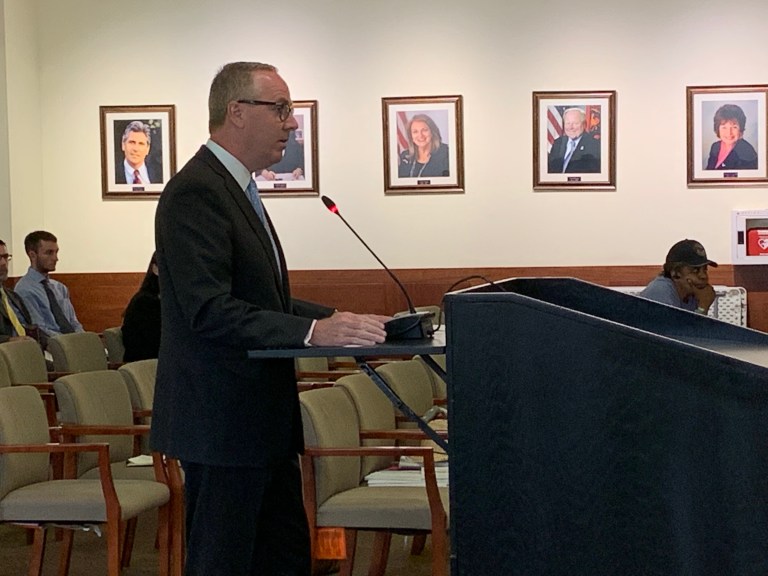
The Nassau County assessor will remain an appointed position after the Nassau County Legislature failed to override the county executive’s veto on Monday.
The 11 Republicans in the County Legislature proposed legislation in March to establish a public vote on whether the Nassau County assessor should be an elected position.
In April, the Legislature approved the bill 10-7 and in May, Nassau County Executive Laura Curran vetoed it.
Monday’s attempt to override Curran’s veto failed when Republican legislators were unable to enlist the needed Democratic support – two votes – to achieve a supermajority of 13 votes. The override was defeated with an 11-8 vote.
Presiding Officer Richard Nicolello (R-New Hyde Park) said the bill would have given the people “the right to decide whether the assessor should be elected and accountable to the residents of Nassau County or appointed and accountable to the county executive.”
He said an elected assessor would be responsible, make herself available to the people and demand transparency from the Department of Assessment. Traits he said the appointed Nassau County Assessor David Moog has not maintained.
Nicolello said that Moog has not held one forum to answer questions in any majority-held district in the county and the assessment process has been riddled with errors.
The errors that the presiding officer listed include the wrong assessment roll being posted in January with 18,400 errors in property tax assessments, 60,000 tax impact notices requiring correction in November 2018 because the assessor used preliminary home values instead of final values and 20,000 assessment disclosure notices being recalculated because the property tax assessments exceeded the state property tax cap.
“We can go on and on but no one has been held accountable for any of this,” Nicolello said.
Curran, in a press release, defended her decision to veto touting the results of an independent analysis which concluded the reassessment “eliminated the inaccurate and unfair wide disparities among home values that developed under the Mangano Administration with an unqualified assessor.”
Minority Leader Kevan Abrahams (D-Freeport) said the two previous elected assessors in the county did not have the credentials for the position.
He said the bill before the Legislature did not require the elected assessor to have any credentials or prior experience in the position.
Abrahams said that the people of Nassau County voted to no longer elect the assessor in 2009 because the office was being politicized.
A job of this magnitude should be “done by somebody that has credentials and the background to do the job right,” he said. “Not someone who is going to make decisions based off how many votes they are going to get out of a particular area.”
He said the accountability for an appointed assessor’s mistakes falls on the person who appointed the official.
“The county executive has not run away from that accountability,” Abrahams said. “She’s accepted it.”
Abrahams noted that while it has been suggested that the referendum would give the power back to the people, he said when the Democratic legislators wanted to give the “power to the people to decide whether or not there should be inspector general, that fell on deaf ears.”
Nassau County Comptroller Jack Schnirman in a May 17 letter addressed to the Legislature shared findings from his recent audit of the county’s Department of Assessment for officials to consider when voting on the veto.
The letter states that from 2011 to 2018, the state had no record of the acting assessor having attained certification to be a state-certified assessor.
The comptroller’s audit goes further to say that “by appointing and promoting an uncertified acting assessor, it appears that the former County Executive effectively controlled Assessment decisions.” Due to the acting assessor not having been approved by the Legislature, he or she could be fired by the county executive at any time and was also able to bypass term limits.
Schnirman’s office suggests that county officials consider extending the assessor’s term to six years from three years to allow for more independence from the county executive. An elected county executive serves a four-year term.
Hempstead Town Tax Receiver Don Clavin, who supported a veto override, said during the hearing, “Unfortunately, history over the past decade has shown that a system of appointed assessors has been disappointingly unsuccessful.”
He said he longs for the days of Harvey Levinson, who is Nassau County’s last elected assessor that served from 2004 to 2008. He was elected as a Democrat.
“Maybe Harvey didn’t have the background credentials,” Clavin said. “Harvey was a very dedicated public servant who came out of the district attorney’s office and brought a very unique perspective to that office.”
“Sometimes having credentials doesn’t get it done,” Clavin said.






